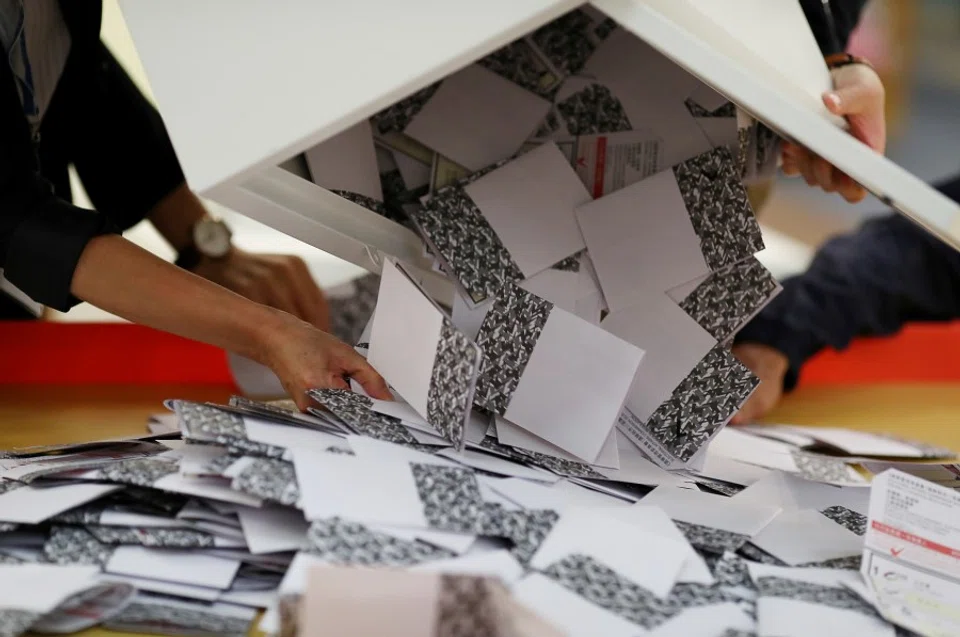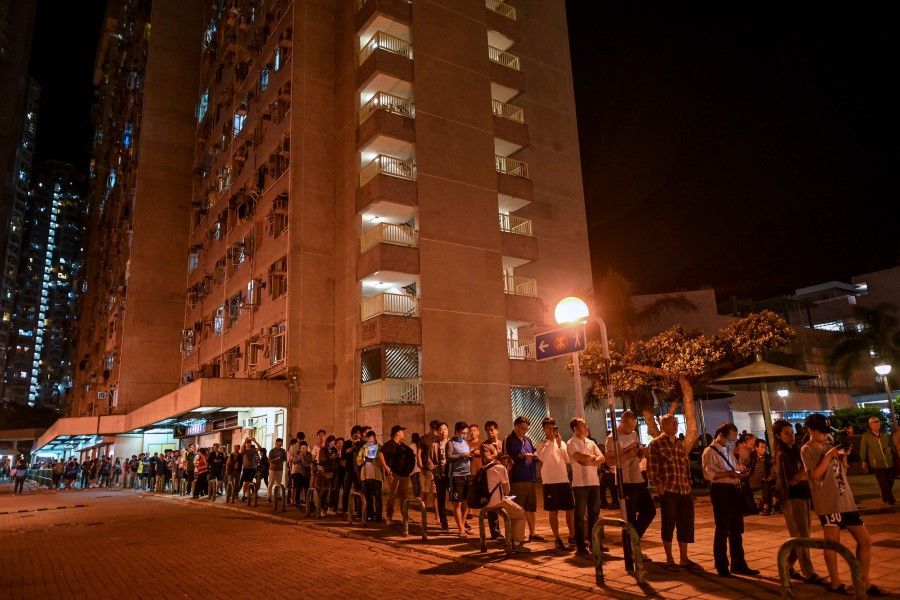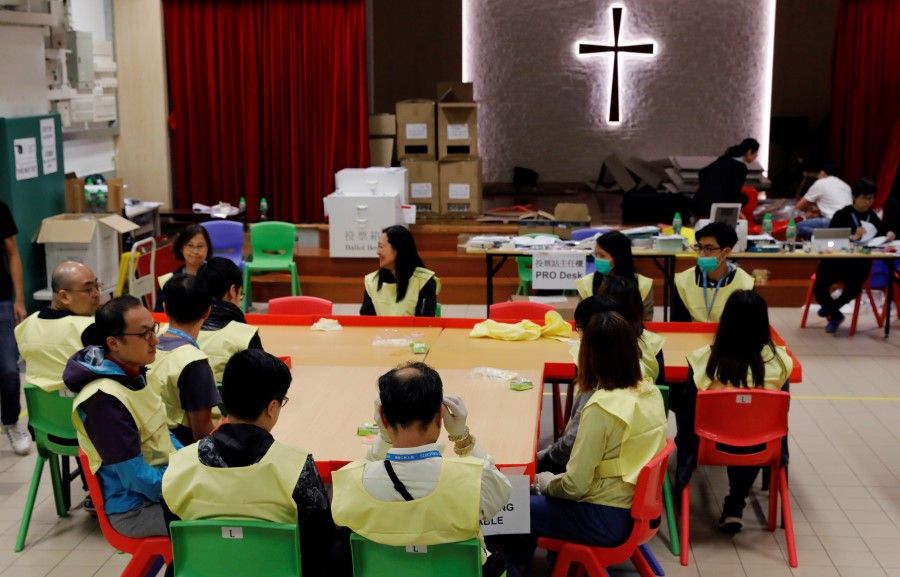Mainland Chinese media fails to influence Hong Kong voters

The mainstream media in mainland China took pains to drive home the point that yesterday's district council elections in Hong Kong were a crucial opportunity to rescue Hong Kong, calling on Hong Kongers to turn out and vote to end the chaos by electing patriots who love the people of Hong Kong as representatives.
What is the future of Hong Kong? Who can build a prosperous and stable Hong Kong? How can the interests of the people of Hong Kong be safeguarded? Behind all these questions is one common answer: ending the violence and restoring order.
A People's Daily commentary yesterday said that Hong Kong has been subjected to months of "black terror", with many people settling their scores privately with those that held different views from the violent extremists. And while it was the minority engaging in violence, it was frightening that this minority was using violence to hijack the will of the majority and was trying to silence the majority. What is the future of Hong Kong? Who can build a prosperous and stable Hong Kong? How can the interests of the people of Hong Kong be safeguarded? Behind all these questions is one common answer: ending the violence and restoring order.
The commentary said that while Hong Kong had a good foundation, it could not afford to miss out on growth opportunities that once gone were lost for good, and would not be able to withstand endless troubles and internal strife. It said that it was time for Hong Kongers to act, and the silent majority had to hit back.
It said Hong Kongers had a chance to vote to end the violence and say no to troublemakers in Hong Kong, and urged voters to rescue Hong Kong by electing those who would truly work for the people and for Hong Kong.
Two days ago, CCTV also ran a commentary headlined "Rescue Hong Kong; vote to end the violence" (挽救香港、一票止暴), stressing that voting in the district council elections was an opportunity to rescue Hong Kong.
The commentary said over the five months of troubles over the extradition bill, the pro-protest politicians have made excuses for the protesters, twisted the facts, and romanticised violence. They have become obstacles to ending the violence and chaos in Hong Kong. It said Hong Kongers had a chance to vote to end the violence and say no to troublemakers in Hong Kong, and urged voters to rescue Hong Kong by electing those who would truly work for the people and for Hong Kong.
State media company China Media Group yesterday aired a discussion of the Greater Bay Area, urging the people of Hong Kong not to underestimate the power of a single vote and to vote wisely, because the representatives elected would determine the lives of Hong Kongers and the future of Hong Kong.
The comments harshly criticised the actions of the opposition in Hong Kong as working for their foreign masters, with many people called troublemakers and modern-day traitors to China. The comments called on Hong Kongers to open their eyes, because there was no reason votes should go to candidates who damage Hong Kong. Instead, the focus should be on candidates who had the people's interests at heart and who built up rather than tore down Hong Kong's institutions.

In addition, haiwainet.cn (under People's Daily) reported yesterday that hundreds of thousands of Hong Kongers who live and work in mainland China have gone back to Hong Kong just to cast their vote.
The report quoted a Ms Liang from Hong Kong who runs a business in Foshan, as saying that she had arranged with other Hong Kongers in Foshan to go back to Hong Kong to vote in support of patriotic candidates who loved Hong Kong. Previously, Hong Kongers working in mainland China might not have gone back to Hong Kong just to vote, but this time was different, as enthusiasm was running high.
Despite the above, the official media of mainland China has never had much influence in Hong Kong. It is unlikely that these calls, and the Hong Kongers in mainland China going back to vote, can stop the opposition candidates from winning in the elections and ending the chaos.

If the Hong Kong opposition wins big in the district council elections, the momentum of the anti-extradition bill movement - which had quietened down recently - would pick up again, and the activists would be encouraged to continue protesting in the streets, which might affect next year's legislative council elections. An opposition victory would also show that while the past five months of chaos has had a major impact on daily life in Hong Kong, ground sentiment lies firmly with the opposition.
... the Chinese authorities have elevated ending the violence to the level of maintaining sovereignty, opposing independence for Hong Kong, and opposing foreign interference in Hong Kong's affairs. In such major matters of principle, there is no room for the Chinese authorities to compromise or give way.
However, even a big win for the opposition is unlikely to shake the resolve of the Chinese central government, the Hong Kong government, and the Hong Kong police to end the violence and bring the chaos under control, nor is it likely that the protesters' five demands will be met.
This is because the Chinese authorities have elevated ending the violence to the level of maintaining sovereignty, opposing independence for Hong Kong, and opposing foreign interference in Hong Kong's affairs. In such major matters of principle, there is no room for the Chinese authorities to compromise or give way.
In an interview with CCTV on Saturday, newly appointed Hong Kong Commissioner of Police Chris Tang said Chinese president Xi Jinping firmly supports strict enforcement of the law by the Hong Kong police - which is a very important message for them - and that they will make ending the violence their current top priority.
So, the district council election results may boost the morale of the opposition, but it will not change the political situation of the Chinese government being in charge of Hong Kong. As for when the chaos in Hong Kong will end, besides the efforts of the parties involved, it also depends on how much more chaos the majority of Hong Kongers can take.
(The article's headline and standfirst were added by ThinkChina after the announcement of the election results.)
